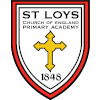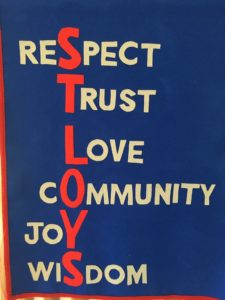St Loys CEVA Primary Academy promotes the fundamental British values of democracy, the rule of law, individual liberty, and mutual respect and tolerance of those with different faiths and beliefs. The Teachers’ Standards expect teachers to uphold public trust in the profession and maintain high standards of ethics and behaviour, within and outside school.
At the heart of realising these values lies our children’s Spiritual, Moral, Social and Cultural (SMSC) education, encompassing personal development across the whole curriculum and through which we endeavour to:
• enable our children to develop their self-knowledge, self-esteem, self-confidence and empower them to have a voice;
• enable our children to distinguish right from wrong and to respect democracy and the civil and criminal law of England;
• encourage our children to accept responsibility for their behaviour, show initiative, and to understand how they can contribute positively to the local, national and global communities around them;
• enable our children to acquire an appreciation of and respect for their own and other cultures;
British Values: Knowledge and Understanding
Through our teaching, children will develop:
• an understanding of how, as citizens, we can influence decision-making through the democratic Process (e.g. Election to and working of the School Council);
• an appreciation that living under the rule of law protects individual citizens and is essential for their wellbeing and safety;
• an ability to be reflective about their own beliefs (religious or otherwise) and perspective on life, and the knowledge of how their own and others cultural influences have shaped this heritage;
• an acceptance that other people having different faiths or beliefs to oneself (or having none) should be accepted and tolerated, and should not be the cause of prejudicial or discriminatory behaviour…….and
• an understanding of the importance of identifying and combatting discrimination, knowing right from wrong and readily apply this understanding in their own lives
Actions in support of this, include:
• learning about the strengths, advantages and disadvantages of democracy, and how democracy and the law works in Britain, in contrast to other forms of government in other countries and prepare them for life in modern Britain;
• ensuring that all our pupils within the school have a voice that is listened to and demonstrate how democracy works by actively promoting democratic processes eg. all year groups represented in School Council;
• utilise opportunities eg. general or local elections, and invite in professionals from the justice system to hold mock elections, thus providing pupils with the opportunity to learn how to argue and defend points of view;
• use teaching resources from our RE syllabus and a wide variety of sources to support pupils in exploring, showing understanding of and respectful attitudes towards different religious, ethnic and socio-economic groups;
- actively encourage our pupils to develop a willingness to participate in and respond positively to artistic, musical, sporting and cultural opportunities.

